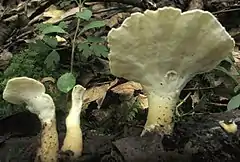| Loweomyces | |
|---|---|
 | |
| Loweomyces fractipes | |
| Scientific classification | |
| Kingdom: | |
| Division: | |
| Class: | |
| Order: | |
| Family: | |
| Genus: | Loweomyces |
| Type species | |
| Loweomyces fractipes (Berk. & M.A.Curtis) Jülich (1982) | |
| Species | |
|
L. fractipes | |
| Synonyms[1] | |
| |
Loweomyces is a genus of six species of poroid fungi in the family Steccherinaceae (formerly placed in the Meruliaceae).[2]
Taxonomy
It was originally circumscribed as a subgenus of Spongipellis by the Czech mycologists František Kotlaba and Zdeněk Pouzar in 1976.[3] Swiss mycologist Walter Jülich promoted it to a genus segregate from Spongipellis in 1982, with two species: L. fractipes (the type), and L. wynneae. Jülich thought the genus should be distinct from Spongipellis based on the larger basidia, the absence of skeletal hyphae, and smaller tubes.[4] L. fractipes and L. wynneae have had their generic positions confirmed with molecular phylogenetics, and both group in the "residual polyploid clade", one of four main lineages of the Polyporales.[2][5] The genus is named in honour of American mycologist and polypore specialist Josiah Lincoln Lowe.[6]
Description
Loweomyces is distinguished by the ease of spore germination in growth media, larger basidia, the absence of skeletal hyphae, and smaller tubes, plates or spines, compared with European Spongipellis species.[4] Fruit bodies are either crust-like or have a cap and stipe. The hyphal system is either monomitic (possessing only generative hyphae) or dimitic (having both generative and pseudo-skeletal hyphae).[7]
Species
The genus contained four species as of January 2015.[8] Two new species from Brazil were described in 2016.[7]
- Loweomyces fractipes (Berk. & M.A.Curtis) Jülich (1982) – Europe; North America
- Loweomyces sibiricus (Penzina & Ryvarden) (Spirin 2006)[9]
- Loweomyces spissus Westphalen, Tomšovský & Rajchenb. (2016) – Brazil
- Loweomyces subgiganteus (Berk. & M.A.Curtis) (Spirin 2006)[9]
- Loweomyces tomentosus Westphalen, Tomšovský & Rajchenb. (2016)– Brazil
- Loweomyces wynneae (Berk. & Broome) Jülich (1982) – Europe
References
- ↑ "Loweomyces (Kotl. & Pouzar) Jülich". Species Fungorum. CAB International. Retrieved 2015-01-28.
- 1 2 Miettinen, Otto; Larsson, Ellen; Sjökvist, Elisabet; Larsson, Karl-Henrik (2012). "Comprehensive taxon sampling reveals unaccounted diversity and morphological plasticity in a group of dimitic polypores (Polyporales, Basidiomycota)". Cladistics. 28 (3): 251–270. doi:10.1111/j.1096-0031.2011.00380.x. PMID 34872189. S2CID 84643554.
- ↑ Kotlába, F.; Pouzar, Z. (1976). "On the taxonomic position of Polyporus fractipes". Memoirs of the New York Botanical Garden. 28: 119–28.
- 1 2 Jülich, W. (1982). "Notes on some Basidiomycetes (Aphyllophorales and Heterobasidiomycetes)". Persoonia. 11 (4): 421–428.
- ↑ Binder, Manfred; Justo, Alfredo; Riley, Robert; Salamov, Asaf; Lopez-Giraldez, Francesc; Sjökvist, Elisabet; Copeland, Alex; Foster, Brian; Sun, Hui; Larsson, Ellen; Larsson, Karl-Henrik; Townsend, Jeffrey; Grigoriev, Igor V.; Hibbett, David S. (2013). "Phylogenetic and phylogenomic overview of the Polyporales". Mycologia. 105 (6): 1350–1373. doi:10.3852/13-003. PMID 23935031. S2CID 20812924.
- ↑ Ginns, J.; Worrall, J. (2003). "Josiah Lincoln Lowe, 1905–1997". Mycologia. 95 (2): 374–378. doi:10.1080/15572536.2004.11833124. JSTOR 3762050. S2CID 87524545.

- 1 2 Westphalen, Mauro C.; Tomšovský, Michal; Rajchenberg, Mario; Gugliotta, Adriana M. (2016). "Morphological and phylogenetic studies of two new neotropical species of Loweomyces (Polyporales, Basidiomycota)". Mycological Progress. 16 (9): 967–975. doi:10.1007/s11557-016-1223-7. S2CID 6176376.
- ↑ Kirk, P.M. "Species Fungorum (version 22nd December 2014). In: Species 2000 & ITIS Catalogue of Life". Retrieved 2015-01-28.
- 1 2 Zmitrovich, Ivan V.; Malysheva, Vera F.; Spirin, Wjacheslav A. (2006). "A new morphological arrangement of the Polyporales. I. Phanerochaetineae" (PDF). Mycena. 6: 4–56.